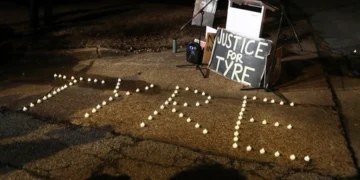May 31, 2025 Story by: Editor
In a lawsuit filed Tuesday in Cole County Circuit Court, the Missouri NAACP accuses Attorney General Andrew Bailey of violating state law by omitting the “disparity index” from the 2023 annual Vehicle Stops Report. The disparity index measures whether minority motorists are stopped by police at rates disproportionate to their share of the driving-age population.
Rod Chapel, president of the Missouri NAACP and a plaintiff in the lawsuit, said questions about the usefulness of a data point are not enough to excuse ignoring the law that requires it.
“The requirements of the statute are clear, there shall be a disparity index that is produced by the attorney general,” he said. “Last year, Attorney General Bailey recognized that, I think, in his summary, and chose not to do it.”
The NAACP contends that Missouri law mandates the inclusion of this index in the annual report. The lawsuit also alleges that both Bailey’s office and the University of Missouri violated the state’s Sunshine Law by withholding documents explaining the rationale behind the omission and whether the index was calculated at all.
In the executive summary of the 2023 report, Bailey’s office stated that the disparity index was removed due to concerns about its analytical value and potential for misinterpretation. The summary argued that the report already provides detailed information on traffic stops relative to subgroup populations, rendering the index redundant.
However, Missouri NAACP President Nimrod Chapel Jr., a plaintiff in the lawsuit, asserts that the removal of the disparity index violates statutory requirements. “The requirements of the statute are clear; there shall be a disparity index that is produced by the attorney general,” Chapel said.
The 2023 report, covering data from 538 police agencies, recorded nearly 1.4 million traffic stops, resulting in approximately 570,000 citations and 57,713 arrests. White motorists accounted for 77% of stops, Black motorists 17.3%, and Hispanic motorists 3.1%. An independent calculation by the Missouri Independent found a disparity index of 1.59 for Black drivers, indicating they were stopped at rates higher than their population share, while white drivers had an index of 0.97.
The vehicle stops report has been published since 2000 under a law intended to detect and prevent racial profiling of motorists. The data reported has been refined over the years, including the disparity index.
The most recent version of the disparity index, before it was discontinued, was calculated based on total stops within a jurisdiction and for stops of motorists who reside within that jurisdiction.
That is an improvement in the data, Chapel said, because it shows whether minority visitors to tourist areas are being stopped in greater numbers than the resident population. The NAACP travel advisory for Missouri issued in 2017 used data from the vehicle stops reports to state that “African Americans are 75 per cent more likely to be stopped and searched based on skin color than Caucasians.”
The NAACP’s lawsuit seeks a court order directing Bailey to publish the disparity index calculations for the state and the 538 police agencies that submitted reports. It also requests a declaration affirming Bailey’s statutory obligation to include the index in future reports and to release records related to the decision to omit it.
The University of Missouri performed calculations presented in the report, and the NAACP sought records regarding those calculations and the decision not to include the index. On May 16, the university, after taking six months, delivered 44,300 documents. But it also said, according to the lawsuit, that “many of the records identified in response to your search criteria have been withheld” under Sunshine Law provisions allowing records to be closed.
The case underscores ongoing concerns about transparency and accountability in law enforcement practices, particularly regarding racial disparities in traffic stops. The outcome of this lawsuit may have significant implications for how such data is reported and utilized in Missouri and potentially beyond.
Source: ABC17NEWS / Missouri Independent / Kansas City Star

















